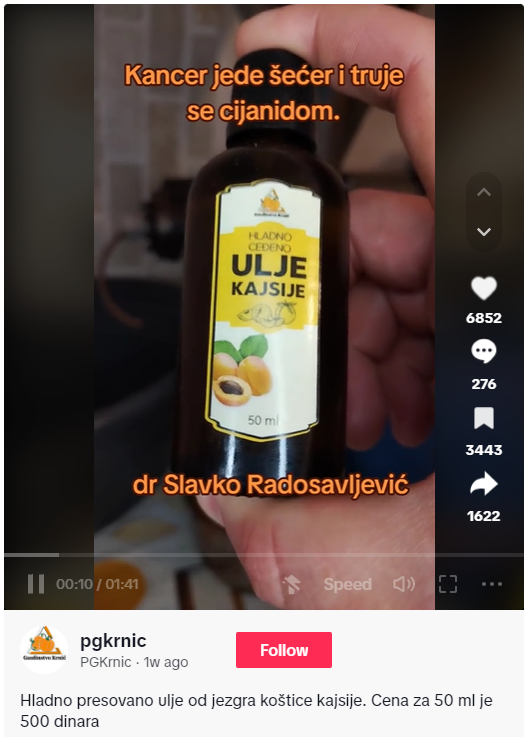
Is cyanide from apricot kernels poisonous for cancer cells, and should it be taken as a preventive measure against cancer? No, that's not true: There is no substantiated evidence supporting the notion that apricot seeds can prevent cancer. Consuming apricot seeds can be harmful due to amygdalin, a chemical compound that metabolizes into the poison cyanide when ingested.
The claim appeared in a video (archived here) on TikTok on March 8, 2024, under the title (translated from Serbian to English by Lead Stories staff) "Cold-pressed apricot kernel seed. The price for 50 ml is 500 dinars." It opened (as translated):
Cancer loves sugar, and the cyanide in the apricot kernel is surrounded by sugar. Cancer eats sugar and poisons itself with cyanide. That is why it is very important to consume apricot kernel oil. Also, Dr. Slavko Radosavljević says that in the vitamin B17 molecule, there are two units of sugar, one cyanide and one benzaldehyde, which are released in the human body only in the place where the malignant cell is located. So it is most important that this apricot kernel oil is taken preventively
This is what the post looked like on TikTok at the time of writing:

(Source: TikTok screenshot taken on Fri Mar 15 09:10:30 2024 UTC)
The U.S. Food and Drug Administration (FDA) has alerted internet users (archived here) about online scams that promote apricot kernels (synonymous with apricot seeds) as a cure for cancer. The seeds contain amygdalin (archived here), a chemical compound that turns into a toxin upon ingestion. The compound is also called "laetrile" (archived here) and "vitamin B17," despite its lack of vitamin classification. The U.S. National Cancer Institute released a fact sheet (archived here) regarding laetrile/amygdalin/Vitamin B17, refuting the notion that they serve as an effective treatment against cancer cells.
Laboratory and animal studies have assessed the impact of laetrile through laboratory experiments, with results (archived here) indicating that none of the examined solid tumors or leukemias responded to amygdalin across tested doses. There was no statistically significant improvement in animal survival observed across any treatment groups. Comparable outcomes were noted in another study involving the implantation of human breast cancer and colon cancer cells into mice. However, controlled clinical trials involving laetrile in human subjects have not been conducted.
The FDA listed amygdalin among the products that are being promoted and sold "on websites or social media" that consumers should be warned about (archived here). The agency also emphasized the dangers of the chemical compound (archived here). Other organizations, such as the Singapore Food Agency (archived here) and the Australian Cancer Council (archived here) have warned about the dangers of laetrile and explained that the notion of laetrile, selectively targeting malignant cells while sparing others, is false.
According to the U.S. National Cancer Institute, the side effects associated with laetrile toxicity mirror the symptoms of cyanide poisoning, including liver damage, difficulty walking (caused by damaged nerves), fever, coma and death (archived here).








